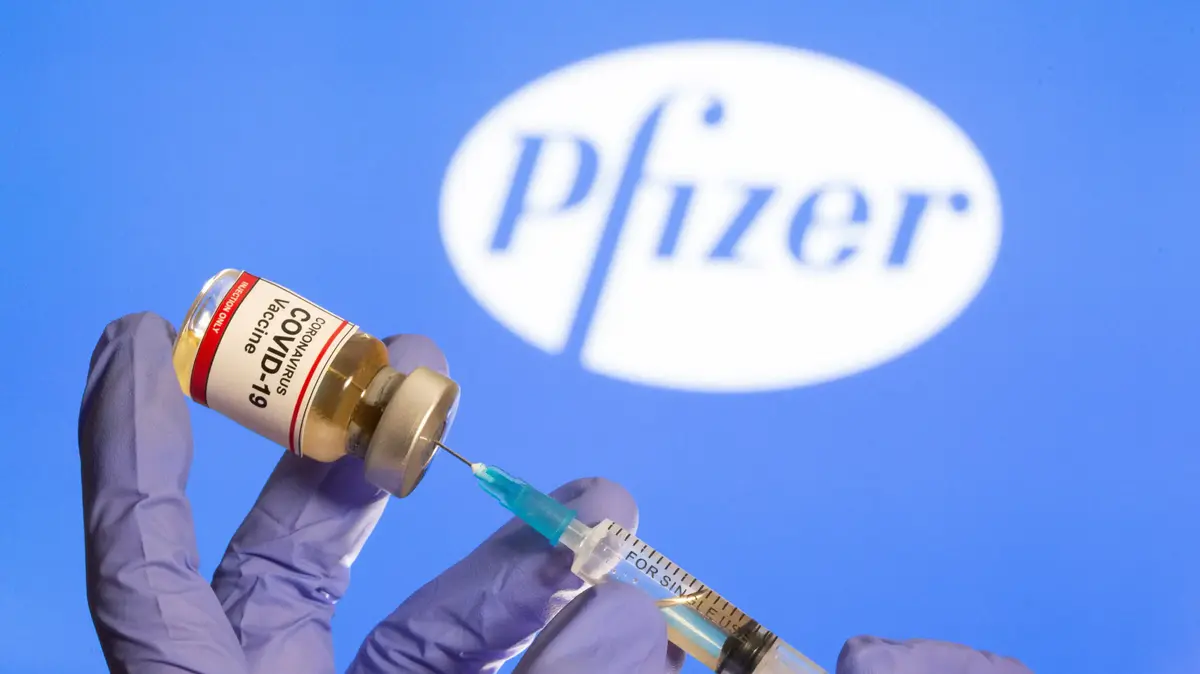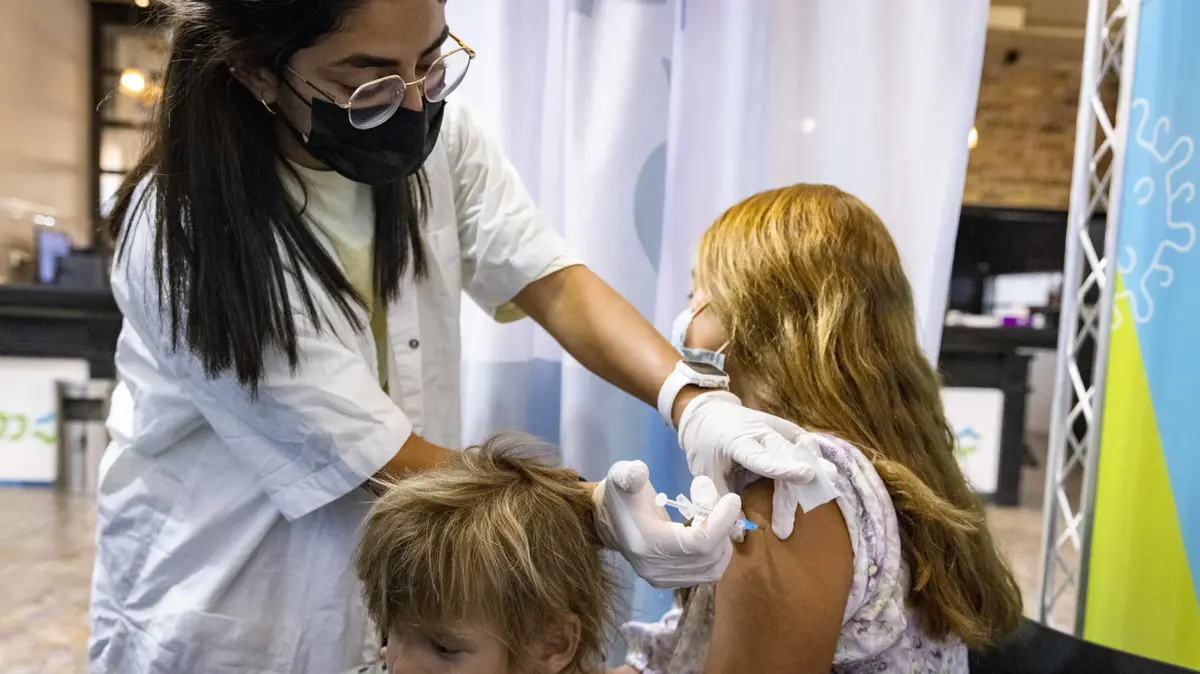Enlarge image
Self-sufficient:
Employees of the Astrazeneca supplier IRBM in Rome receive the Astrazeneca vaccine
Photo: ANGELO CARCONI / EPA
The business is secondary.
The management of Biontech around
Uğur Şahin
(55)
cultivates this impression
.
The Mainz-based biotech company is doing all it can to make the first approved corona vaccine available on a large scale and thus to end the pandemic.
Even if the investors have big plans for the company as a crisis winner, the founder and medicine professor does not talk about it - except about the medical benefits of the many mRNA vaccines that Biontech still has in the pipeline and could more easily realize thanks to the Covid success.
This Wednesday, Biontech dared to make a sales forecast for 2021 for the first time: 9.8 billion euros, based on the 200 million doses of the corona vaccine Comirnaty already delivered and 1.4 billion firmly ordered doses.
At the same time, however, the company announced that it had increased its production target for this year together with its US partner Pfizer to 2.5 billion vaccine doses.
The income could be almost twice as high, depending on the price.
Biontech is still keeping a low profile on the expected profit, but lists rising costs for research and investments, and the orders to other companies for the production of the vaccine are likely to cost a lot.
What is left is to be invested in research for other vaccines as well.
Pfizer: Back to the top of the industry thanks to Biontech
Pfizer boss
Albert Bourla
(59) is less shy.
As early as February, Bourla stated that the group's spectacular profit prospects with the Covid vaccine would not be sufficiently appreciated by the stock exchange.
Pfizer is expecting Comirnaty to have $ 15 billion in sales this year - based on previous orders alone, the vaccine would shoot to the top of the top-selling drugs in the world.
Targeted profit margin: over 25 percent, i.e. around four billion dollars in net profit, with plenty of room for improvement with additional sales.
Because Biontech and Pfizer share the development costs and gross profit 50:50 in most of the world, Biontech markets the vaccine alone in Germany and in China (previously only active in Hong Kong) shares the proceeds with Fosun instead of Pfizer, some analysts calculated for the German Startup already has high business figures that are even higher than those of Bourla.
Bourla's aggressive prognosis doesn't stop there.
It is "increasingly likely" that booster vaccinations or new formulas against emerging corona mutations will be necessary in the coming years.
From the Group's point of view, this means above all that a "sustainable income stream" will also be created for 2022 and the following years.
In addition, Bourla feels very certain that "we would have the lion's share in an open market" if doctors and citizens could freely choose their vaccine.
Now Pfizer wants to build up a new business area with RNA vaccines for other diseases - "We like to work with Biontech, but we don't necessarily need Biontech," boasted a spokeswoman last week.
The US group completed the development of a decade in just a few months.
Pfizer is making a huge business bet: the once world's largest pharmaceutical company, which has fallen to eighth place in the new sales ranking of the industry service "Fierce Pharma" due to the sale of the generics business, should return to the top with Biontech's help this year - and more profitably than before .
Johnson & Johnson: The current number one as a non-profit company
Current industry leader Johnson & Johnson is also in the vaccine race.
The Covid vaccine is now being used in the USA and should also come to Europe in April.
The company expects to sell one billion cans this year, which would add up to a considerable turnover of 10 billion dollars after the US average of 10 dollars.
However, Johnson & Johnson's business forecast, which sees 7.5 percent growth to $ 88.8 billion, excludes vaccines.
Like the other Big Pharma representatives with the exception of Pfizers, the group has undertaken to sell the vaccine at cost price during the pandemic.
"A company listed on the New York Stock Exchange doesn't normally do that," admits CFO
Joe Wolk
(54).
However, responsibility for public health must also be reflected in pricing policy.
After all, the Americans are not among the corona losers like Roche, Novartis or Merck & Co., who missed billions in sales due to reduced doctor visits or delayed approvals.
Moderna: Going it alone into the turning point
In second place after commercial success behind Pfizer / Biontech is Moderna - like Biontech, a biotech startup that is experiencing its first market success with the Covid vaccine.
The US company even tries without an established partner from the pharmaceutical industry, but with more financial backing and logistical support from the state.
The Moderna vaccine is comparatively little widespread, the target of up to one billion doses this year is already considered ambitious - but the drug is the most expensive on the market, the EU pays around 36 dollars per dose.
Moderna boss
Stéphane Bancel
(48) speaks of a "turning point" for his company and, according to his own statements, already has a turnover of 18.4 billion dollars.
Barclays analyst Gena Wang has even more confidence in Moderna, and earnings of over $ 10 billion from booster vaccinations for the next few years.
Novavax: the darling of the stock market
If the stock market has its way, no vaccine manufacturer has received more boost from its Corona project than Novavax.
The share achieved a fabulous 2700 percent price performance, and up until February it rose again steeply.
The biotech company founded in 1987, which has already had some spectacular setbacks with other vaccines, is still waiting for its market breakthrough.
Novavax boss
Stanley Erck
(72)
hopes in April that
British approval will come, followed by the USA and the EU.
Whether the other vaccine, based on protein, a new, unproven technology, is still needed?
"The world is big."
In any case, Novavax believes it can produce significantly cheaper and faster than its competitors, and generate "several billion dollars" in sales over the next twelve months.
For Africa, the company only wants to take three dollars per dose, and yet the analysts still expect an average profit of billions.
However, the remedy has yet to prevail.
Curevac: Inexpensive straggler
The same applies to the German company Curevac, which was talked about a lot at the beginning of the vaccine race.
The IPO on the Nasdaq last summer gave the federally backed company of main investor
Dietmar Hopp
(80) a further boost, but the crucial clinical study is still ongoing.
The aim is to apply for approval in the second quarter.
Curevac has already practically written off the US market, and for the rest of the year there is still a prospect of sales of up to 300 million cans, thanks to large orders from the EU, and up to a billion by 2022.
Large corporations like Bayer or Glaxosmithkline should help.
Curevac still expects medium-term opportunities because the RNA vaccine uses a lower concentration of active ingredients than the comparable products from Biontech and Moderna.
As a result, states also have to pay less per dose.
But the people of Tübingen do not want to go under 10 euros.
After all, investors expected a return - and in return for the pharmaceutical giants, the corona vaccine is their only product so far.
Astrazeneca: The focus is elsewhere
Actually, the Oxford vaccine marketed by the British-Swedish company Astrazeneca should have been the star, the targeted production capacity of up to three billion doses is the largest so far.
In particular, the supply of developing countries through the global Covax initiative depends on the serum.
But Astrazeneca puts down an unprecedented series of breakdowns in the public eye.
There is not much to gain for the group led by
Pascal Soriot
(61).
The vaccine developers at Oxford University have secured assurances that their product will benefit the world without making a profit.
If the cost reported by Astrazeneca is one fifth too high, there is a risk of contractual penalties.
The Oxford researchers actually wanted to push through an even more radical break with the rules of the pharmaceutical industry and make their formula available royalty-free - open source for a global public good.
With his foundation, Bill Gates put pressure to win over an established company for the start.
The British government asked for one from home, and so Astrazeneca got into the vaccines business, which could generate billions of dollars because of the high volume - sales, not profits.
In the midst of the vaccination chaos, Soriot announced a deal in December that is far more interesting for the future: he plans to take over Alexion, a US company specializing in drugs against rare diseases, for 39 billion dollars.
It's the complete opposite of the corona vaccine business - minimal quantities, but maximal prices.
The Alexion drug Soliris has long been considered the most expensive drug in the world.
Now Soriot has to hope that the takeover will go through in the course of the year, even though the Biden government announced in mid-March that it would look more closely at pharmaceutical mergers and their consequences for drug prices - and that the vaccine angry would not stop him from doing this.
ak









